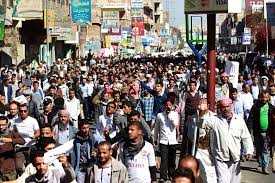Hawzah News Agency (Sanaa, Yemen) - For a third consecutive day, Yemenis on Wednesday took to the streets of the southern provinces of Hadarmaut and Aden, which are controlled by pro-Hadi forces.
The demonstrators voiced anger at the worsening economic situation in Yemen, including rising prices and the collapse of the national currency.
They also chanted slogans against Saudi Arabia and the UAE, which are leading an offensive, code-named Operation Decisive Storm, on Yemen since March 2015 in an attempt to reinstall Hadi, a staunch ally of Riyadh, and crush the Houthi Ansarullah movement.
Hadi had resigned as Yemen’s president and fled to Riyadh before the launch of the Saudi-led campaign.
The protests, however, turned ugly as pro-Hadi forces opened fire on the protesters to disperse them, killing one of them in the city of Mukalla in Hadarmaut.
Yemen’s southern areas—which are controlled by Saudi-backed officials of the former Yemeni government—have been the scene of protests over the past days, with the demonstrators calling for a rise in their salaries.
Some chanted, “Pay our salaries in dollars like you take yours in dollars,” a reference to the self-proclaimed officials living abroad amid a domestic currency crisis.
After demonstrations paralyzed Aden a day earlier, Hadi’s self pro-claimed government ordered a package of economic measures, but it failed to satisfy the protesters.
The ex-president then headed to the US earlier this week for “medical treatment.”
The abrupt visit to Washington comes ahead of a new session of peace talks between Yemen’s warring sides in Geneva, Switzerland.
The broader state affairs are being run by Yemen’s Houthi Ansarullah movement from the capital, Sana’a, in the absence of an effective government.
The movement, backed by allied forces, is also defending the country against the Saudi-led aggression.
UN envoy hopeful about upcoming talks
Separately on Wednesday, the United Nations special envoy for Yemen voiced confidence in the planned negotiations despite a delay as the delegation representing the Houthis remains stranded at the Sana’a airport.
Speaking at a press conference in Geneva, where the peace talks are expected to be held, Martin Griffiths said that delays are common for discussion on Yemen.
“If you look back at previous negotiations on Yemen, there’s always been a delay to begin. I don’t take it very seriously. We'll make it happen, we're finalizing arrangements,” he said.
Griffiths also noted that “formal consultations” with the representatives of the Hadi administration will start on Wednesday night, stressing that the Houthi delegation is keen to attend the Geneva talks.
“So we’re not going to waste time. And we’re looking forward to getting our friends from Sana'a here and participating fully in the consultations. I know they want to do it. I've spent a lot of time talking to them and their leaders, and I know they want to be here. And we're going to make sure they can come here and do that,” he said.
The remarks came after Yemen’s al-Masirah television network reported that the Houthi representatives had been stranded at the Sana’a airport unable to “secure authorization” from the Saudi- led coalition for a plane to transport its delegation and injured fighters.
Houthi spokesman Mohammed Abdulsalam tweeted on Tuesday that the UN had “made promises on facilitating the transport of the wounded... abroad,” but had stalled the process.
Elsewhere in his comments, the UN envoy said that the Geneva talks offered a “flickering signal of hope” to the people of Yemen after years of conflict gripping the Arabian Peninsula country.
The last round of Yemen peace talks collapsed in 2016 despite more than three months of negotiations in Kuwait.
‘Saudis not after peace’
University lecturer Colin Cavell told Press TV that the Riyadh regime does not want peace in Yemen and is preventing the Houthi delegation from attending the Geneva talks.
“There [are] two parties to a conflict, if they want peace they get together and talk. If they don’t want peace then they don’t get together. What is happening here is the corrupt Saudi regime does not want the Yemeni people to have a delegation in Geneva to discuss peace. Why? because the Saudi regime does not want peace," he said.
“They are … trying to retain Western hegemony in the Arabian Peninsula and they want to destroy the Houthi movement, they want to destroy the freedom movement of the Yemeni people and they will not let their delegation come to Geneva – why - because simply they do not want peace and the entire world should know that the Saudis started this war, they are continuing this war and they do not want war to end," he added.
Houthis conduct retaliatory attacks
On Thursday, reports said the Yemeni army and its allied Houthi fighters had launched a drone attack on the Abha airport in Saudi Arabia's southwestern Asir region.
The Yemeni unmanned combat aerial vehicle was of Qasef-1 (Striker-1) type.
The strike was conducted in retaliation for the Saudi Arabia's deadly military campaign on Yemen.
Additionally, the Yemeni army's air defense system managed to shoot down an Apache helicopter belonging to the Saudi-led coalition in Hudaydah Province.
The Saudi aggression initially consisted of a bombing campaign, but was later coupled with a naval blockade and the deployment of ground forces into Yemen.
The imposed war, however, has so far failed to achieve its goals, thanks to stiff resistance from Yemeni troops and allied Houthi fighters.
Several Western countries have been supplying Saudi Arabia with advanced weapons and military equipment.

